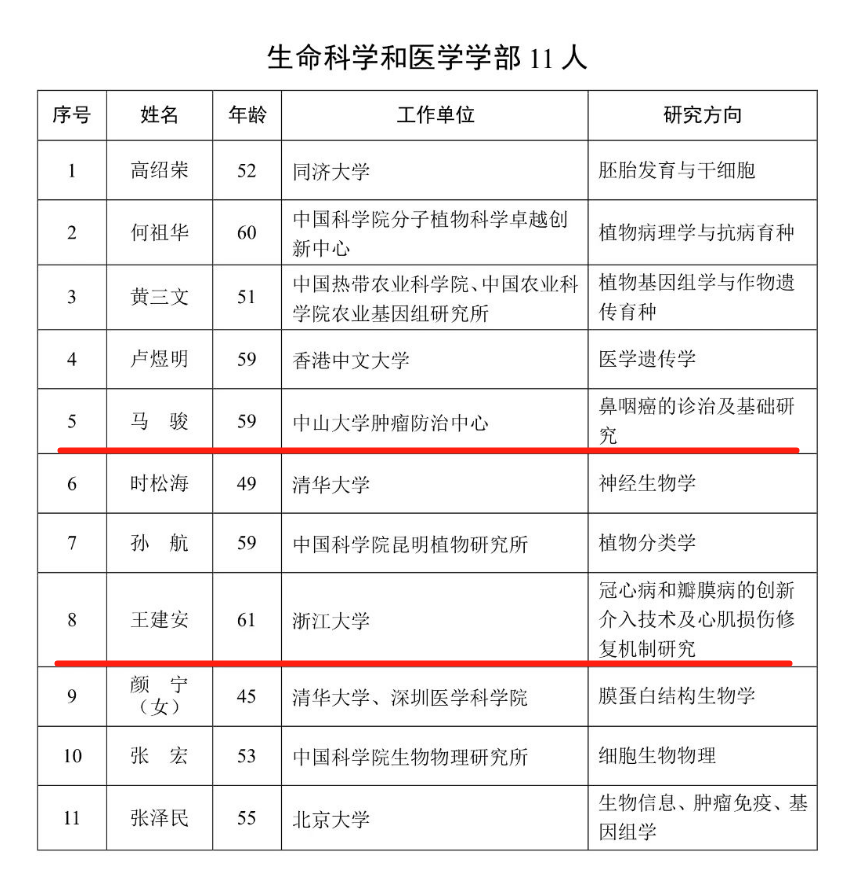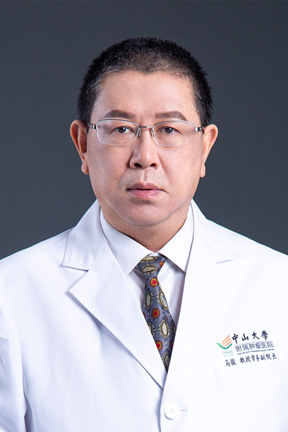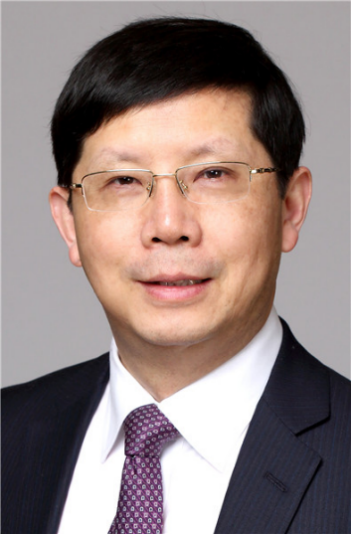In a recent announcement, the Chinese Academy of Sciences revealed the names of newly elected fellows for the year 2023. According to the regulations outlined in the "Constitution of the Chinese Academy of Sciences" and the "Implementation Measures for the Election of Fellows of the Chinese Academy of Sciences (Trial)," a total of 59 new fellows have been elected to the Chinese Academy of Sciences in 2023.
Ma Jun, an alumnus of the 1980 class of Xiangya School of Medicine (formerly Hunan Medical College), and Wang Jian'an, an alumnus of the 1978 class, have been successfully elected as fellows of the Chinese Academy of Sciences!
Xiangya School of Medicine extends its warmest congratulations to these two outstanding alumni for their election as fellows!
Over the years, Xiangya Medical Education has consistently embraced the spirit of "Seeking Truth and Precision, Be Profound and Specialized," maintaining high standards and strict requirements to nurture high-quality medical talents for the nation. The election of these two distinguished alumni as fellows is a remarkable achievement for Xiangya Medical Education!
Nurturing talents for the nation, the news of these two outstanding alumni being elected as fellows is both uplifting and inspiring! Faculty and students of Xiangya express their determination to follow the example of these alumni, adhering to the motto of "Public Courage, Diligence, Prudence, Love, Humility, and Integrity," fostering a sense of patriotism, and actively contributing to the country.

Alumni Profiles:

Ma Jun: alumnus of the 1980 class of Xiangya School of Medicine (formerly Hunan Medical College), is a professor, chief physician, doctoral supervisor, and chief expert in radiotherapy for nasopharyngeal carcinoma. He currently serves as the Executive Vice President of Sun Yat-sen University Cancer Center, Convener of the Eighth Discipline Evaluation Group (Specialized Medicine) of the Academic Degrees Committee of the State Council, Member of the Life Medical Sciences Committee of the Eighth Science and Technology Committee of the Ministry of Education, Director of the Nasopharyngeal Carcinoma Expert Committee of the Chinese Society of Clinical Oncology, Chairman of the Nasopharyngeal Carcinoma Professional Committee of the China Anti-Cancer Association, Chairman of the Radiation Oncology Professional Committee of the Guangdong Medical Association, and Co-Chair of the Nasopharyngeal Carcinoma Clinical Diagnosis and Treatment Guidelines Committee of the Sino-American Clinical Oncology Association. Professor Ma Jun is a leading international expert in the diagnosis and treatment of nasopharyngeal carcinoma, a cancer type with a high incidence in China (accounting for 47% of global cases). Over the years, he has conducted a series of studies focusing on identifying and eliminating systemic micrometastases, the root cause of metastatic recurrence in nasopharyngeal carcinoma. He proposed the "enhancement" theory, emphasizing that the combination of gemcitabine and cisplatin for systemic chemotherapy can reshape the anti-tumor immune response with B cells as the core, effectively clearing systemic micrometastases. He formulated a new strategy of "first-line GP systemic chemotherapy, followed by local radiotherapy," significantly improving the survival rate of patients with advanced nasopharyngeal carcinoma. Additionally, he introduced the "detoxification" theory, suggesting the use of clinical staging combined with miRNA molecular markers to identify low-risk patients with minimal micrometastases, allowing for reduced treatment intensity. This "detoxification" strategy includes exemptions from chemotherapy and narrowing the scope of radiation therapy, significantly reducing the toxic side effects of chemotherapy and radiation therapy and improving the quality of life. Professor Ma Jun has received two second prizes for national scientific and technological progress, as well as numerous other honors and awards, including the He Liang and He Li Foundation Scientific and Technological Progress Award, the Tan Jiazhen Clinical Medicine Award, the Wu Jieping Medical Innovation Award, the First National Innovation Pioneer Award, the National Outstanding Science and Technology Worker Award, the Guangdong Province Outstanding Contribution Award, the National Innovation Team Award for South China, and the Guangdong Model Worker and Innovative Talent Innovation Studio, among others. In 2018, Professor Ma Jun was appointed as a reviewer for the Annual Meeting of the American Society of Clinical Oncology, making him the only scholar from Asia.

Wang Jian'an: alumnus of the 1978 class of Xiangya School of Medicine (formerly Hunan Medical College), is a medical doctor, professor, doctoral supervisor, and the 14th National Committee of the Chinese People's Political Consultative Conference (CPPCC) member. He currently serves as the Party Secretary of the Second Affiliated Hospital of the School of Medicine, Director of the Heart Center, Vice President (Concurrent) of Zhejiang University School of Medicine, and the project leader for the National Major Scientific Research Program (973) and key research and development projects. Wang Jian'an has made a series of innovative achievements in the significant scientific issues related to the post-reconstruction of cardiac function after heart failure, particularly in the field of valvular and coronary functional studies. He is a renowned and internationally influential cardiovascular expert in China. Wang Jian'an serves as the inaugural editor-in-chief of the Asian edition of the Journal of the American College of Cardiology (JACC: Asia), Co-Chairman of the European Conference on Congenital Heart Structure and Valve Intervention, Co-Editor-in-Chief of the National Textbook "Internal Medicine," Director of the National Key Laboratory for Cardiovascular Implant Devices, Director of the National Cardiovascular Disease Regional Medical Center (Construction), and Deputy Director of the Cardiovascular Disease Branch of the Chinese Medical Association. As a corresponding author, he has published more than 150 articles in renowned journals such as NEJM, Circulation, JACC, Science Translational Medicine, Circulation Research, and PNAS. As the first author, he has received a second prize for national scientific and technological progress and four first prizes at the provincial and ministerial levels. He has also been honored with awards such as the He Liang and He Li Foundation Award, the Tan Jiazhen Clinical Medicine Award, the Wu Jieping Science and Technology Progress Award, and the National Norman Bethune Medal.
(Reviewed by: Office of Comprehensive Affairs, Huang Gengwen, Chang Shi)